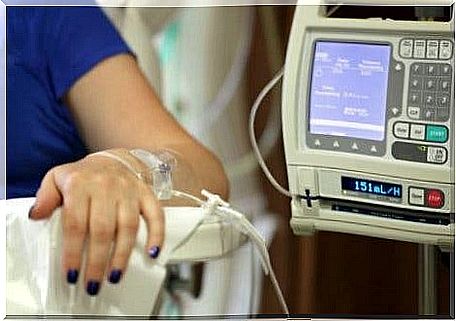Antiemetics To Prevent Nausea And Vomiting

Currently, we have different medications that are effective in preventing nausea and vomiting from different sources. They are called antiemetics.
It is important to differentiate the two terms. Nausea is an unpleasant feeling in the throat and stomach that usually precedes vomiting. It is usually accompanied by other symptoms, such as paleness, sweating, excessive salivation, and sometimes a decrease in blood pressure and the number of heartbeats per minute.
After nausea, there are vomiting cravings, which are the self-effort to empty the gastric contents. These are strong contractions of the muscles in the abdominal wall. They aim to create the pressure needed to vomit.
Cravings can occur along with vomiting, precede it or follow it. Finally, vomiting, known clinically as emesis, is the rapid and energetic emptying or expulsion of gastric contents. Sometimes the intestinal contents are also expelled.
What are antiemetics?

As the name suggests, antiemetic medications are those used to prevent nausea and vomiting. They are generally indicated to treat seasickness and the side effects of the following pharmacological groups:
- Opioid analgesics.
- General anesthetics.
- Targeted chemotherapy against cancer.
Antiemetics are divided into different groups depending on their mechanism of action. In this way they will be effective in different situations depending on the cause causing the nausea and vomiting.
In this regard, we will look at the most widely used antiemetics to prevent nausea and vomiting depending on their origin.
Antiemetics to prevent nausea and vomiting
for pregnancy
Nausea and vomiting during pregnancy affect about 80% of women. They are usually mild and, most of the time, disappear by the 20th week of pregnancy.
Clinical evidence on the treatment of hyperemesis gravidarum is very limited. Furthermore, in most cases, studies have been performed in patients with these symptoms in the mildest form.
Accordingly, in some countries, only doxylamine is authorized as an antiemetic to prevent nausea and vomiting during pregnancy. It is an antiemetic histamine H1 receptor antagonist.
As a second line, metoclopramide, a dopamine antagonist, is often administered. However, this drug should not be administered for more than 5 days at a dose of 10 mg up to three times a day. Ondansetron is also given as a second line. As the third line, methylprednisolone is indicated, adjusting the dose to the minimum effective.
Chemotherapy

Certain medications used to fight cancer can cause nausea and vomiting. Fortunately, there are already many medications that are effective in preventing and alleviating these symptoms associated with chemotherapy.
Among the most used antiemetics for these cases, we find:
- Corticosteroids: have been used successfully for many years, mainly to prevent nausea and late vomiting. An example of these medications is dexamethasone, which can be given in many different ways.
- Serotonin antagonists: block natural substances that send the signal to the brain that causes vomiting. Prevent acute and delayed nausea and vomiting. Some of the most used are ondansetron, granisetron and dolasetron.
- NK-1 Inhibitors : These drugs are the newest. Aprepitant is used when chemotherapy is likely to cause acute or delayed nausea and vomiting. It is taken before a chemotherapy session and for two days afterwards.
dizziness or motion sickness

The dizziness and nausea that occur during travel is also called motion sickness or “movement sickness”. It is defined as the appearance of nausea, vomiting and symptoms produced by repeated linear and angular acceleration and deceleration.
To reduce symptoms, it is recommended to take a drug that reduces labyrinth reactivity. So the recommendations are:
- For an adult : 2 hours before travel, take 30 mg of an anti-emetic called cinnarizine. The dose can be repeated every 8 hours. It can also be given between 50 and 100 mg of dimenhydrinate (Biodramine), which can be repeated every 6 to 8 hours.
- Children: the dose should be adjusted according to the information leaflet for each drug. However, the use of thiethylperazine is not recommended.
Conclusion
Fortunately, we currently have a wide therapeutic range to prevent nausea and vomiting depending on its source. However, as we always advise, consult your doctor or pharmacist if you have any questions about these medications to improve the therapeutic effectiveness that these antiemetics offer.









